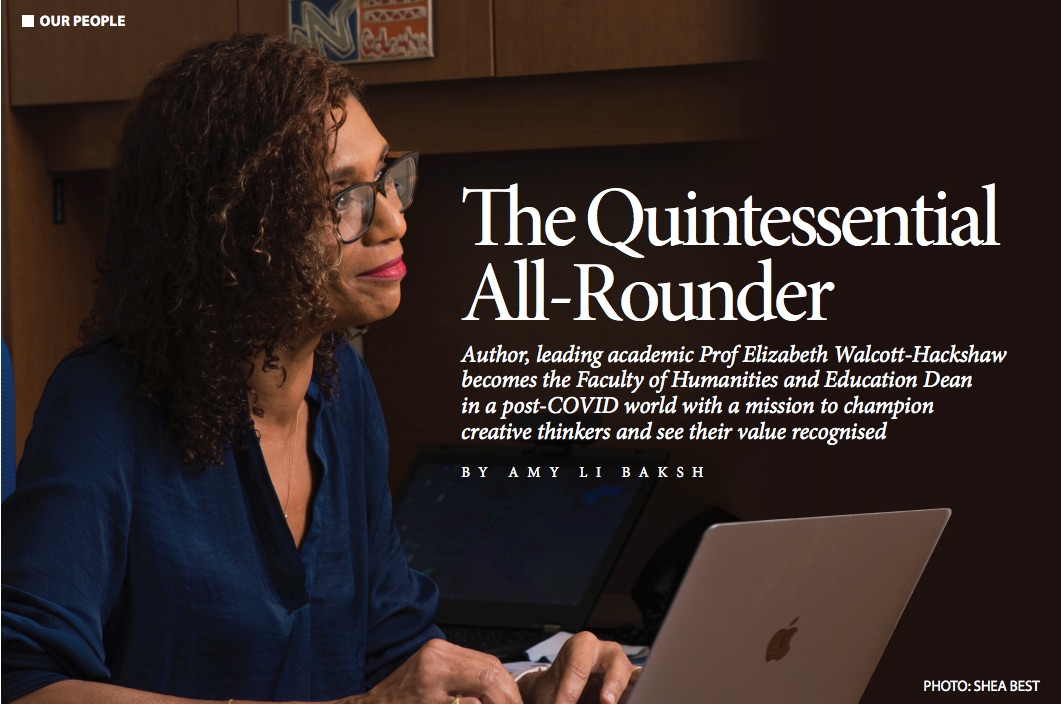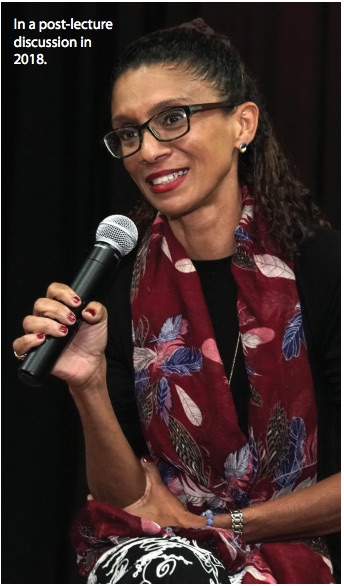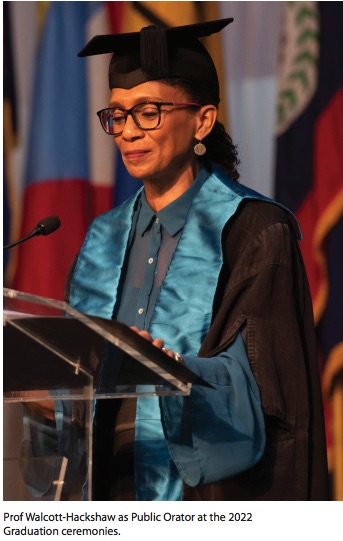
At The UWI St Augustine campus, in the office of the Dean of the Faculty of Humanities and Education (FHE), there is a large board. Something between a vision board and a mood board, filled with the faces of Professor Elizabeth Walcott-Hackshaw’s family, students and art. “Faces, and sayings, and people, and artwork, and friends, and things that I believe in,” she explained.
It’s no coincidence that this board was one of the items that Professor Walcott-Hackshaw felt she “couldn’t live without” when she moved into the Office of the Dean after taking up the mantle on August 1. It reflects her deep value for people, for creativity, and for the community around her.
After two years of quiet campus grounds and online learning, the university is back to a flurry of life and activity as staff and students try to find a new way of learning and teaching in a post-COVID world. For Professor Walcott-Hackshaw, this value for people and sensitivity for the world around us has helped guide her in taking on a role with all-new challenges.
“We think we’re coming to the tail end of [COVID-19] and I would agree in terms of the biological part of it... we’re having fewer people infected; not as many hospitalisations and deaths. The part that I do not think is winding down yet is the collective trauma that we’ve all been through. That sort of trauma on a collective and individual level takes a while to work through. Mentally, we are still trying to come to terms with it.”
Across the globe, there has been a decline in registration in the humanities fields, and part of her goal is to address that locally and find ways to make the FHE experience more rewarding for students and teachers alike.
As someone who enjoys seeing people, talking and chatting, Prof Walcott-Hackshaw was excited to be back out to the world of UWI.
“Seeing the students back on campus has been a true joy. It has filled everyone with a sort of energy and purpose.”
But, it has been an adjustment from the two years of isolation we have all faced, and there is a learning curve both for her as a new Dean, and the entire staff coming back out from remote work.
Across the globe, there has been a decline in registration in the humanities fields, and part of her goal is to address that locally and find ways to make the FHE experience more rewarding for students and teachers alike.

“I came up with REP: Recruitment, Experience and Placement,” she says. Her goal is to focus on encouraging students to see the value of getting into the humanities, to enrich their experiences while on campus, and to help them along their career journey once they have graduated with initiatives like internships.
As former Head of the Department of Modern Languages and Linguistics, Prof Walcott-Hackshaw cut her teeth as a leader in the department under the reign of COVID. As the campus opened up, and she was able to move physically into the office of the Dean and be back on the St Augustine grounds, she credits her success so far to the support and guidance of much of the staff at FHE, as well as the outgoing Dean, Dr Heather Cato, who once described Prof Walcott-Hackshaw as “the quintessential all-rounder” of academia and creative writing.
This all-roundedness has served the new Dean well in understanding the strange circumstances we find ourselves in as we near the end of 2022. Studying our Caribbean history, literature, art and culture gives one a depth of understanding of our collective psychology; our pain, our joy, our past and future. From her inaugural lecture in 2018, she was already exploring what she referred to as “trauma poetics” in the Caribbean. The way in which our history remains marked in our DNA.
Now, in real time, we have witnessed a deepening of this trauma over the past few years, experiencing loss and isolation, and emotional and economic hardship that will continue to have ripple effects on us all as we move forward.

But even through hardship, we must also acknowledge our collective resilience and ability to affect positive change.
“I would love for the next cohort [of creative thinkers emerging from FHE] to be able to insert themselves a little more in the current conversations. Things like climate change, food and nutrition. New ideas about education, the way we can move forward from traditional modes. A Humanities and Education degree can set them on paths that are perhaps very different than they would have imagined,” says Prof Walcott-Hackshaw.
She goes on to highlight the value of the “creative analytical skills” learned in these fields, and how they can be used to bring about change and transformation. The Humanities are not separate and apart from all other fields of knowledge, but instead are interwoven into every aspect of life and can truly bring a depth of understanding to our Caribbean identity and how to solve our unique problems, as well as a much needed perspective on our place in the world at large.
“University is a special time for students – the connections you make stay with you for the rest of your life,” says Prof Walcott-Hackshaw. “So, it’s important that the experience is solid and enriching.”
As a former graduate of FHE myself, with very fond memories of my time there, I am inclined to agree.